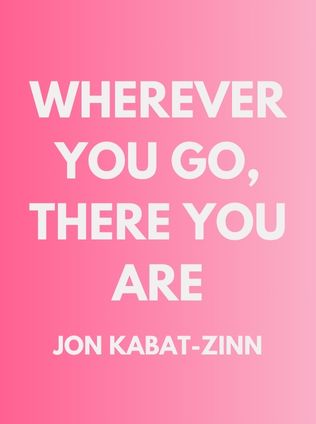
Wherever You Go, There You Are
Mindfulness Meditation in Everyday Life
By Jon Kabat-Zinn
Published 01/1994
About the Author
Jon Kabat-Zinn is widely recognized as a pioneer in integrating mindfulness into mainstream Western medicine. He is a professor emeritus of medicine at the University of Massachusetts Medical School, where he founded the Mindfulness-Based Stress Reduction (MBSR) Clinic in 1979. Kabat-Zinn's work has been instrumental in bringing the practice of mindfulness to the attention of the medical community and the general public. His efforts have led to widespread adoption of mindfulness techniques in both clinical and non-clinical settings, influencing the treatment of stress, anxiety, chronic pain, and other conditions.
Kabat-Zinn's contributions extend beyond the medical field. He has authored several influential books on mindfulness, including Full Catastrophe Living, Coming to Our Senses, and Everyday Blessings, which he co-authored with his wife, Myla Kabat-Zinn. His books have been translated into multiple languages and have inspired millions of readers worldwide to explore mindfulness as a way to enhance their quality of life. Kabat-Zinn's teachings are rooted in the principles of mindfulness meditation, but he presents them in a secular, accessible manner that resonates with people from all walks of life.
One of his most well-known works, Wherever You Go, There You Are, published in 1994, is often cited as a seminal text in the field of mindfulness. The book offers an introduction to mindfulness practice and provides practical strategies for incorporating mindfulness into daily life. Kabat-Zinn's ability to articulate complex concepts in a simple, relatable way has made his work a cornerstone of the mindfulness movement.
Main Idea
In Wherever You Go, There You Are, Jon Kabat-Zinn introduces mindfulness as a practice of living fully in the present moment. He argues that many of us are constantly distracted by thoughts of the past or future, which prevents us from experiencing the richness of the present. Mindfulness, according to Kabat-Zinn, is a tool that allows us to cultivate awareness and appreciation of each moment, leading to a deeper connection with ourselves and the world around us.
Kabat-Zinn's approach to mindfulness is both practical and philosophical. He explains that mindfulness is not about achieving a particular state of mind or escaping from reality, but about being fully present with whatever is happening, without judgment. By embracing mindfulness, we can develop greater self-awareness, reduce stress, and enhance our overall well-being. The practice of mindfulness, as Kabat-Zinn describes it, is accessible to everyone, regardless of their background or experience. It is a way of being that can be integrated into all aspects of life, from daily routines to moments of deep reflection.
Table of Contents
- Introduction to Mindfulness
- The Importance of Mindfulness
- Practicing Mindfulness Through Meditation
- Incorporating Mindfulness into Daily Life
- Conclusion: Living Mindfully
Introduction to Mindfulness
Mindfulness, as Jon Kabat-Zinn explains, is the practice of paying attention to the present moment with full awareness and without judgment. It is a way to interrupt the habitual patterns of distraction that dominate our lives and to cultivate a deeper connection with what is happening right now. Kabat-Zinn describes mindfulness as a form of "non-doing," which is different from doing nothing; it is a deliberate and conscious practice of being fully present.
"Mindfulness means paying attention in a particular way: on purpose, in the present moment, and non-judgmentally." — Jon Kabat-Zinn
Kabat-Zinn emphasizes that mindfulness is not about changing or controlling our thoughts but rather observing them without attachment. By stepping back from our thoughts, we can learn to see them more clearly and understand their influence on our emotions and actions. This practice of observation allows us to become more aware of the habitual thought patterns that shape our experiences, and to respond to them with greater clarity and intention.
The book opens with a discussion of the nature of mindfulness and its relevance to our everyday lives. Kabat-Zinn argues that many of us live in a constant state of distraction, either preoccupied with the past or worried about the future. This state of mind, he explains, prevents us from fully engaging with the present moment and appreciating the richness of our experiences. Mindfulness offers a way to break free from this cycle of distraction and to reconnect with the present, allowing us to live more fully and intentionally.
One of the key themes of the book is the idea that mindfulness is not something that we need to "do" or "achieve," but rather a way of being that we can cultivate through practice. Kabat-Zinn explains that mindfulness is about being fully present with whatever is happening, without trying to change it or escape from it. This attitude of acceptance and non-judgment is at the heart of mindfulness practice, and it is what allows us to experience the present moment with clarity and openness.
Sign up for FREE and get access to 1,400+ books summaries.
You May Also Like
The Subtle Art of Not Giving a F*ck
A Counterintuitive Approach to Living a Good Life
By Mark MansonRich Dad Poor Dad
What the Rich Teach Their Kids About Money - That the Poor and Middle Class Do Not!
By Robert T. KiyosakiHow To Win Friends and Influence People
The All-Time Classic Manual Of People Skills
By Dale CarnegieFreakonomics
A Rogue Economist Explores the Hidden Side of Everything
By Steven D. Levitt and Stephen J. Dubner



















